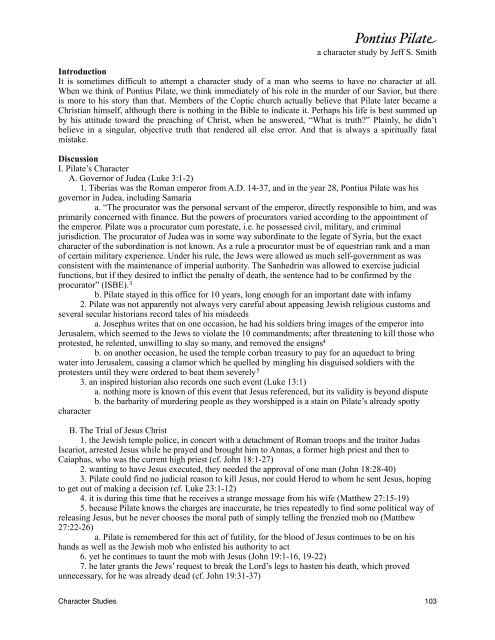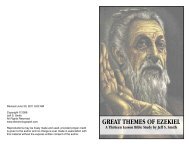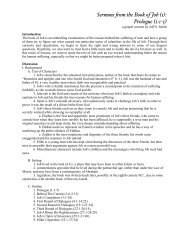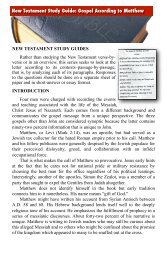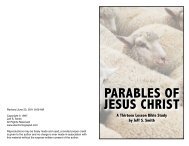Character Studies - ElectronicGospel
Character Studies - ElectronicGospel
Character Studies - ElectronicGospel
- No tags were found...
Create successful ePaper yourself
Turn your PDF publications into a flip-book with our unique Google optimized e-Paper software.
Pontius Pilatea character study by Jeff S. SmithIntroductionIt is sometimes difficult to attempt a character study of a man who seems to have no character at all.When we think of Pontius Pilate, we think immediately of his role in the murder of our Savior, but thereis more to his story than that. Members of the Coptic church actually believe that Pilate later became aChristian himself, although there is nothing in the Bible to indicate it. Perhaps his life is best summed upby his attitude toward the preaching of Christ, when he answered, “What is truth?” Plainly, he didn’tbelieve in a singular, objective truth that rendered all else error. And that is always a spiritually fatalmistake.DiscussionI. Pilate’s <strong>Character</strong>A. Governor of Judea (Luke 3:1-2)1. Tiberias was the Roman emperor from A.D. 14-37, and in the year 28, Pontius Pilate was hisgovernor in Judea, including Samariaa. “The procurator was the personal servant of the emperor, directly responsible to him, and wasprimarily concerned with finance. But the powers of procurators varied according to the appointment ofthe emperor. Pilate was a procurator cum porestate, i.e. he possessed civil, military, and criminaljurisdiction. The procurator of Judea was in some way subordinate to the legate of Syria, but the exactcharacter of the subordination is not known. As a rule a procurator must be of equestrian rank and a manof certain military experience. Under his rule, the Jews were allowed as much self-government as wasconsistent with the maintenance of imperial authority. The Sanhedrin was allowed to exercise judicialfunctions, but if they desired to inflict the penalty of death, the sentence had to be confirmed by theprocurator” (ISBE). 3b. Pilate stayed in this office for 10 years, long enough for an important date with infamy2. Pilate was not apparently not always very careful about appeasing Jewish religious customs andseveral secular historians record tales of his misdeedsa. Josephus writes that on one occasion, he had his soldiers bring images of the emperor intoJerusalem, which seemed to the Jews to violate the 10 commandments; after threatening to kill those whoprotested, he relented, unwilling to slay so many, and removed the ensigns 4b. on another occasion, he used the temple corban treasury to pay for an aqueduct to bringwater into Jerusalem, causing a clamor which he quelled by mingling his disguised soldiers with theprotesters until they were ordered to beat them severely 53. an inspired historian also records one such event (Luke 13:1)a. nothing more is known of this event that Jesus referenced, but its validity is beyond disputeb. the barbarity of murdering people as they worshipped is a stain on Pilate’s already spottycharacterB. The Trial of Jesus Christ1. the Jewish temple police, in concert with a detachment of Roman troops and the traitor JudasIscariot, arrested Jesus while he prayed and brought him to Annas, a former high priest and then toCaiaphas, who was the current high priest (cf. John 18:1-27)2. wanting to have Jesus executed, they needed the approval of one man (John 18:28-40)3. Pilate could find no judicial reason to kill Jesus, nor could Herod to whom he sent Jesus, hopingto get out of making a decision (cf. Luke 23:1-12)4. it is during this time that he receives a strange message from his wife (Matthew 27:15-19)5. because Pilate knows the charges are inaccurate, he tries repeatedly to find some political way ofreleasing Jesus, but he never chooses the moral path of simply telling the frenzied mob no (Matthew27:22-26)a. Pilate is remembered for this act of futility, for the blood of Jesus continues to be on hishands as well as the Jewish mob who enlisted his authority to act6. yet he continues to taunt the mob with Jesus (John 19:1-16, 19-22)7. he later grants the Jews’ request to break the Lord’s legs to hasten his death, which provedunnecessary, for he was already dead (cf. John 19:31-37)<strong>Character</strong> <strong>Studies</strong>! 103


